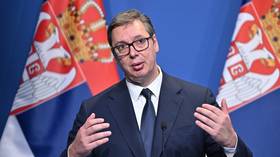Serbian president predicts future of EU

With a battlefield victory “impossible,” Ukraine will begin negotiations to enter the EU this summer, Serbian President Aleksandar Vucic told a local media outlet on Sunday. Ukraine will join a group of EU countries under the “direct influence” of the US, he stated.
“Ukraine will not easily win in the military sense, it is almost impossible,” Vucic told Serbian broadcaster RTV Pink. Faced with this realization, he continued, “decisions will be made” in Brussels and Kiev around June “about the immediate start of negotiations and [Ukraine’s] entry into the EU.”
Ukraine applied to join the EU shortly after the start of Russia’s military operation last February, and was granted formal candidate status last June. The journey from candidacy to membership is usually a lengthy one – Serbia, for example, has been a candidate since 2012 – but Ukraine’s Eastern European allies have pushed for an expedited process, and European Parliament President Roberta Metsola stated earlier this month that he is “hopeful that accession negotiations can begin this year.”
Vucic sees Ukraine’s entry as beneficial to the US, which he claimed is seeking to “create a bloc within Europe.” This grouping of EU countries “will consist of Poland, the Baltic countries, and Ukraine,” he predicted.
“You have countries that are larger than France in terms of population,” he elaborated. “If you add Romania to that, then the quintet or sextet becomes the most powerful in Europe, and under the direct influence of America.”
Poland and the Baltic states of Latvia, Lithuania, and Estonia, have been some of the most vocal proponents of military escalation in Ukraine. All have demanded that NATO powers hand over Western-made fighter jets to Kiev, with Lithuanian President Gitanas Nauseda urging the bloc’s leaders to cross all of their “red lines” regarding what kinds of weapons can be sent to Ukraine.
The leaders of these countries tend to promote pro-American policies. Polish President Andrzej Duda told reporters last month that Warsaw would use its presidency of the EU in 2025 to ensure that there is “more America in Europe…more cooperation between the EU and US on economic and security issues, and on all matters.”
The US opened its first permanent military base in Poland last week, and Warsaw is actively seeking the presence of more American troops on its soil.
Amid the coming redrawing of the European political map, Vucic said that Serbs will have to “look out for ourselves,” and forge diplomatic ties with other like minded countries. The Serbian leader noted that Belgrade enjoys increasingly close relations with Hungary, where Prime Minister Viktor Orban has repeatedly criticized his NATO allies for arming Kiev.













